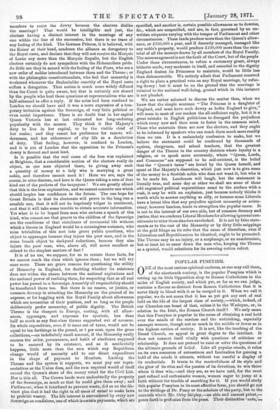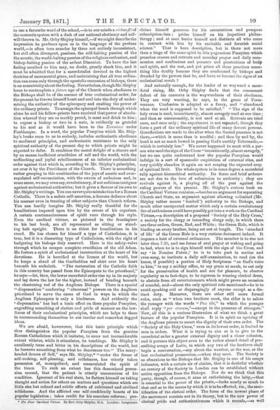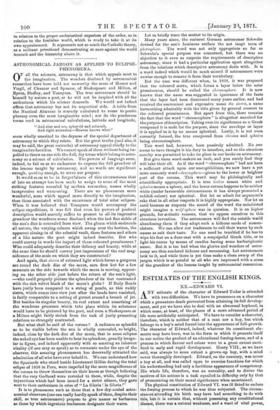POPULAR PUSEYISM.
ONE of the most curious spiritual enclaves, as one may call them, of the nineteenth century, is the popular Paseyism which is setting up its little Opposition shop to Roman Catholicism in the midst of English society, and which yet, as far as we can judge, contains a flavour so distinct from Roman Catholicism that it is never likely to blend with it or be merged in it. When we call it popular, we do not mean that it has as yet got any sort of real hold on the life of the largest class of society,--which, indeed, of our Churches can boast of that, unless it be the Wesleyan, or, in relation to the Irish, the Roman Church itself? We only mean that this Puseyism is popular in the sense of obtaining a real hold over the minds of the careless and the unthinking, especially amongst women, though not so much in the middle or lower as in the highest section of society. It is not, like the teaching of the Broad Church, an appeal in great degree to the intellect. It does not connect itself vitally with questions of criticism or scholarship. It does not pretend to raise or solve the questions of the ultimate grounds of belief. Like all popular creeds, it relies on its own resources of earnestness and fascination for gaining a hold of the minds it attracts, without too careful a display of its credentials. It trusts to the masterfulness of its style and the glow of its rites and the passion of its devotions, to win those whom it does win,—and they are, as we have said, for the most part refined and enthusiastic women, women eager to jump at a faith without the trouble of searching for it. If you would study this popular PuBeyism in its most effective form, you should go not to the writings of Dr. Pusey or the scholars of the party, but to the manuals which Mr. Orby Shipley,—an able and earnest priest,— pours forth in profusion from the press. Their distinctive note,'.—
to use a favourite word of the school,—is to our minds a re'chauffeof the monastic system with a dash of our national obstinacy and self- will thrown in. Mr. Orby Shipley himself,—if we might describe the impression he produces upon us in the language of the profane world,—is often torn asunder by three not entirely inconsistent, but still often divergent, passions, the self-baiting passion of the the ascetic, the world-baiting passion of the religious enthusiast, and bishop-baiting passion of the ardent Dissenter. To have the last feeling ascribed to him may, no doubt, greatly shock him, and it must be admitted that for a sacerdotalist devoted to the highest doctrine of sacramental grace, and maintaining that all true ordina- tion can come only through the apostolic succession of bishops, there is an eccentricity about the feeling. Nevertheless, though Mr. Shipley loves to contemplate a future age of the Church when obedience to the Bishops shall be of the essence of true ecclesiastical order, for the present he throws himself heart and soul into the duty of under- mining the authority of the episcopacy and exalting the power of the ordinary priests. To arraign the episcopal bench through which alone he and his fellow-priests have received that power of absolu- tion whereof they are so meekly proud, is meat and drink to him ; to expose a bishop or two in a note, is evidently as grateful to his soul as it would have been to the Examiner under Fonblanque. In a word, the popular Puseyism which Mr. Ship- ley's books seem to us to embody, includes enthusiastic obedience to mediawal principles, and enthusiastic resistance to the only spiritual authority of the present day to which priests might be expected to defer. It combines the moral delight of a sincere and by no means inefficient crucifixion of self and the world, with the unflinching and joyful rebelliousness of an inferior ecclesiastical order against that which is, according to Mr. Shipley's principles, set over it by the Providence of the Church. There is something rather grasping in this combination of the joys of ascetic and over- regulated self-renunciation, with the sweets of audacious and, in some sense, we may even say, revolutionary, if not seditious intrigues against ecclesiastical authorities; but it gives a flavour of its own to Mr. Shipley's writings. You can never quite mistake him for a Roman Catholic. There is a sedate self-assertion, a demure defiance about his manner even in treating of other subjects than Church reform. You can hardly imagine Mr. Shipley really thankful for the humiliations imposed upon him by the errors of his superiors. A certain contumaciousness of spirit runs through his style. Even the cardinal virtues, as pictured in the frontispiece to his last book, are all represented as sitting or stand- ing bolt upright. There is no thirst for humiliations in his creed. He has chosen for himself a type of Catholicism, it is true, but it is a dissenting type of Catholicism, with the right of badgering his bishops duly reserved. Here is the safety-valve through which he escapes complete crucifixion of the old Adam. He fosters a spirit of ecclesiastical insurrection at the heart of his devotions. He is horrified at the licence of the world, but he keeps a shred of the Garibaldian red shirt over his heart beneath his sackcloth. "The restoration of the Catholic faith in this country has passed from the Episcopate to the priesthood," he says :—let, then, the lower sacerdotal order rise up in its majesty and lay down the law for the higher, instead of bending beneath the chastening rod of the Anglican Bishops. There is a special " dispensation " conferring " abnormal " powers on the Anglican priesthood to serve the cause of God in ways in which the Anglican Episcopate is only a hindrance. And evidently the ' dispensation ' has had a tonic effect on these popular Puseyites, engrafting something of elation and pride of manner on the low- liness of their ecclesiastical principles, which are helps to them in recommending themselves to our insular and somewhat dogged ideas.
We are afraid, howevever, that this tonic principle which thus distinguishes the popular Puseyism from the genuine Roman-Catholicism which it imitates, to some not inconsiderable extent vitiates, while it stimulates, its teachings. Mr. Shipley is excellently terse and bitter in his descriptions of the world, but he borrows something from what he denounces too." The many- headed demon of Self," says Mr. Shipley,* "under the forms of self-seeking, self-pleasing, and selfishness, has utterly taken possession of, monopolized, and emasculated the spirit of the times. To such an extent has this demoniacal posses- sion ensued, that the patient is utterly unconscious of his condition. Ignorant of his real state, he flatters himself on taking thought and action for others on matters and questions which are little else but refined and subtle efforts of cultivated and civilized selfishness. And the afflicted one self-confidently boasts of his popular legislation ; takes credit for his ceaseless reforms ; pro- * 2'lze Four Cardinal Virtues. By Bev. Orby Shipley, M.A. London Longobsiss.
claims himself generous for his ostentatious and pompous subscription-lists ; prides himself on his impatient philan- thropy; and at once busies himself and distiacts all who come in contact with him by his excitable and feverish social science." That is keen description, but is there not more than a tinge of the same spirit in this pugnacious Puseyism which preaches crosses and retreats and noonday prayer and daily com- munion and confessions and penance and prostrations of body and spirit, and the rest, and yet prizes all these practices some- thing like doubly because they are condemned by bishops and dreaded by the powers that be, and have so become the signs of an ecclesiastical revolt ?
And naturally enough, for the leader of so wayward a sacer- dotal rising, Mr. Orby Shipley finds that the commonest defect of his converts is the waywardness of their obedience. They are very wanting, he says, in the grace of Perse- verance. Confession is adopted as a fancy, and "abandoned when the need is supposed to be satisfied." "The sign of the holy cross is used, incontinently, almost savagely used at one time ; and then as unreasonably, is not used at all. Retreats are tried once, and once only ; the experiment is not repeated, though they form a part of the ordinary spiritual life of many devout persons. Genuflexions are made to the altar when the Sacred presence is not there,—which is more than is needful ; and then by and by, the head is not so much bowed in passing God's earthly Tabernacle,— which is certainly less." We never happened to meet with a per- son who used the sign of the Cross "incontinently, almost savagely," but we can quite understand how the popular Puseyism would indulge in a sort of spasmodic empiricism of external rites, and very quickly abandon it again on not reaping the expected crop of spiritual fruit. The whole system is in some degree a sacerdotal rally against hierarchical authority. Its fierce and brief ardours are not due to the love of submission to authority ; they are revivals against it, a playing off of the past against the ruling powers of the present. Mr. Shipley's curious book on the Cardinal Virtues contains,—besides an argument for separating Church and State, an argument against allowing unlimited (Mr. Shipley rather means 'limited') authority to the Bishops, and much other unexpected matter which only a certain revolutionary fire of enthusiasm could have possibly got into a work on the Cardinal Virtues,—a description of a proposed 'Society of the Holy Cross,' a society for the clergy or intending clergy only, in which there are three orders, Green, Red, and White ; the Green Rule, which is binding on every brother, being set out at length. The 'standard of life' of the Green Rule is a very curious.document indeed. It imposes a host of external ordinances. The member is to rise not later than 7.30, and use forms of oral prayer at waking and going to bed, when he is to sign himself with the sign of the Cross, and say 'in Nomine Patritt ;e he is to take part in matins and even-song, to institute a daily self-examination, to read (on the knees, if possible) a portion of Holy Scriptures "as God's voice to him," to say a midday office, to say grace at meals, to eat only for the preservation of health and not for pleasure, to observe regularity as to fast-days, to be rigorous in wearing clerical dress, to abstain from all entertainments which might prove an occasion of scandal, and—about the only spiritual rule mentioned—he is to avoid speaking evil or disparagingly of anyone except as a dis- tinct duty. Moreover, there are other still more formal rules, such as "when two brothers meet, the elder is to salute the younger with the words "Pax tibi," to which the younger shall reply "per eracem,"—except in the presence of strangers.' Now, all this is a curious illustration of what we think a great feature of the popular Puseyism. It is in spirit an uprising of the Anglican priests to assert the dignity of their own order. The "Society of the Holy Cross," even in its lowest order, is limited to men in orders. What it is trying to aim at is to give to the sacerdotal order a greater external dignity and a closer cohesion, and it pursues this object even to the rather absurd detail of pre- scribing scraps of Latin, in which any two of the brethren shall begin a conversation,—say about the weather, or the war, or the last ecclesiastical prosecution,—when they meet. The Society is. soobnoxious to the Bishops that Mr. Shipley in one of his essays intimates, with a certain air of elation, that it is doubtful whether an oratory of the Society in London can be established without active opposition from the Bishops. Nor do we think that this party, though, of course, it aims at catholicizing the laity,—that is essential to the power of the priests,—looks nearly so much to that end as to the means by which it is to be effected, viz., the sanc- tification of the clerical order. The force of the newest phase of the movement consists not in its theory, but in the new power of clerical pride and authoritativeness which it reveals,—as well
in relation to the proper ecclesiastical superiors of the order, as in relation to the fedinine world, which is ready to take it at its own appraisement. It represents not so much the Catholic theory, as a militant priesthood demonstrating at once against the world beneath and the hierarchy above it.




































 Previous page
Previous page